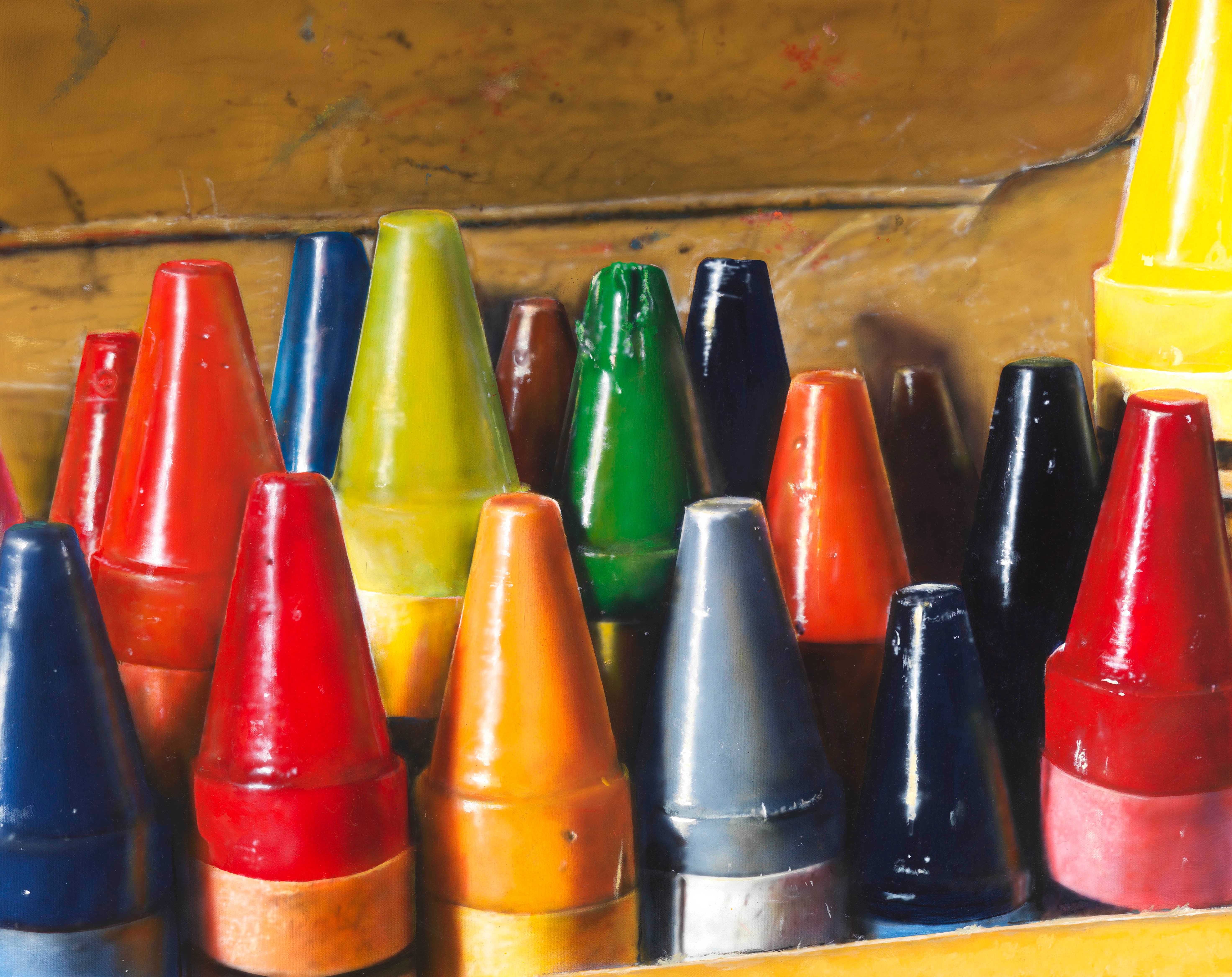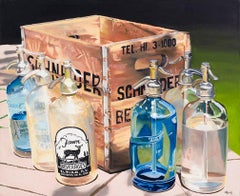Want more images or videos?
Request additional images or videos from the seller
1 of 5
J. Scott NicolMega Pop (Signed and Numbered Limited Edition)2017
2017
Price:$1,000
$1,300List Price
About the Item
- Creator:J. Scott Nicol (1957, American)
- Creation Year:2017
- Dimensions:Height: 36 in (91.44 cm)Width: 27 in (68.58 cm)Depth: 2 in (5.08 cm)
- More Editions & Sizes:48 inches x 36 inchesPrice: $2,200
- Medium:
- Movement & Style:
- Period:
- Condition:
- Gallery Location:Boca Raton, FL
- Reference Number:1stDibs: LU5041775893

About the Seller
5.0
Vetted Professional Seller
Every seller passes strict standards for authenticity and reliability
Established in 1985
1stDibs seller since 2014
159 sales on 1stDibs
Typical response time: 4 hours
Authenticity Guarantee
In the unlikely event there’s an issue with an item’s authenticity, contact us within 1 year for a full refund. DetailsMoney-Back Guarantee
If your item is not as described, is damaged in transit, or does not arrive, contact us within 7 days for a full refund. Details24-Hour Cancellation
You have a 24-hour grace period in which to reconsider your purchase, with no questions asked.Vetted Professional Sellers
Our world-class sellers must adhere to strict standards for service and quality, maintaining the integrity of our listings.Price-Match Guarantee
If you find that a seller listed the same item for a lower price elsewhere, we’ll match it.Trusted Global Delivery
Our best-in-class carrier network provides specialized shipping options worldwide, including custom delivery.You May Also Like
Vintage Jim Dine tool Poster Kestner Gesellschaft 1970 (Hammers 1970) retro red
By Jim Dine
Located in New York, NY
This vintage exhibition poster reproduces Jim Dine’s 1970 lithograph Hammers, which is in the collection of the Museum of Contemporary Art, Chicago. It w...
Category
1970s Pop Art Still-life Prints
Materials
Lithograph
Hole Punch (Jim Dine 30 Bones of My Body portfolio) tool dry point
By Jim Dine
Located in New York, NY
The hand tool is undoubtedly Jim Dine’s most iconic motif. Meticulously catalogued in rows like scientific specimens or sketched individually, hammers, awls, brushes, saws and screwd...
Category
1970s Pop Art Figurative Prints
Materials
Drypoint
$3,000
H 30 in W 22 in
Flower Garden (color trial proof) James Rosenquist Pop Art in black and white
By James Rosenquist
Located in New York, NY
Based on Rosenquist’s 1961 grisaille oil painting Flower Garden, this work arranges a still life using an advertisement for gloves with part of an athlete’s torso. A number 1 can be ...
Category
1970s Pop Art Figurative Prints
Materials
Screen, Lithograph
Phillips Screwdriver (Jim Dine 30 Bones of My Body portfolio) tool dry point
By Jim Dine
Located in New York, NY
The hand tool is undoubtedly Jim Dine’s most iconic motif. Meticulously catalogued in rows like scientific specimens or sketched individually, hammers, awls, brushes, saws and screwdrivers assume a visceral symbolism. Curvilinear handles evoke the contours of limbs or bones, and even metal points and blades seem organic under Dine’s thoughtful hand. In this series of dry point prints...
Category
1970s Pop Art Figurative Prints
Materials
Drypoint
Out of Stock - 2
By Penny
Located in Dallas, TX
Out of Stock - 2
Hand cut holes on reinforced Hahnemühle German
Etching heavyweight Giclee print.
Box framed and float mounted under museum quality no...
Category
21st Century and Contemporary Pop Art Figurative Prints
Materials
Handmade Paper, Giclée
Apple and Lemon
By Roy Lichtenstein
Located in Palo Alto, CA
Roy Lichtenstein Apple and Lemon, 1983 is an excellent example of the artist’s later work. Lichtenstein largely abandoned his famous comic strip pan...
Category
1980s Pop Art Still-life Prints
Materials
Handmade Paper, Woodcut
Pajaro (Green Lamp), Pop Art Serigraph by John Grillo
By John Grillo
Located in Long Island City, NY
Artist: John Grillo, American (1917 - 2014)
Title: Kaleidoscope I
Year: 1978
Medium: Serigraph, signed and numbered in pencil
Edition: 200, AP 30
Image Size: 29.5 x 22 inches
...
Category
1980s Pop Art Figurative Prints
Materials
Screen
Kaleidoscope III, Pop Art Screenprint by John Grillo
By John Grillo
Located in Long Island City, NY
Artist: John Grillo, American (1917 - 2014)
Title: Kaleidoscope III
Year: 1980
Medium: Screenprint, signed and numbered in pencil
Edition: 200
Image Size: 22 x 30 inches
Size: ...
Category
1980s Pop Art Figurative Prints
Materials
Screen
Eye of the Storm, Surrealist Screenprint by Michael Knigin
By Michael Knigin
Located in Long Island City, NY
Artist: Michael Knigin, American (1942 - 2011)
Title: Eye of the Storm
Year: 1971
Medium: Screenprint, signed and numbered in pencil
Edition: 136/200
...
Category
1970s Pop Art Still-life Prints
Materials
Screen
$650
H 22 in W 28.5 in D 0.1 in
Large Donald Saff Surrealist Pop Art Aquatint Etching Bee, Chair, Pot
By Donald Saff
Located in Surfside, FL
Artist: Donald Saff
Medium: Etching with Aquatint, Hand signed and numbered in pencil
Donald Jay Saff (born 12 December 1937) is an artist, art historian, educator, and lecturer, sp...
Category
1980s Pop Art Figurative Prints
Materials
Etching, Aquatint
More From This Seller
View AllSeltzer
By Mark Schiff
Located in Boca Raton, FL
OPAC The Organization of Photorealist Artists and Collectors presents Seltzer, a signed and numbered giclee on canvas by famed photorealist Mark Schiff. This piece is 28" x 34". The ...
Category
2010s Photorealist Interior Prints
Materials
Canvas, Ink
Ceiling of the Paris Opera House
By Marc Chagall
Located in Boca Raton, FL
Ceiling of the Paris Opera House
This is a print made by Center Art Galleries-Hawaii, Inc. You can google their name to get a sense of the litigation surrounding this manufacturer,...
Category
20th Century Romantic Interior Prints
Materials
Paper, Ink
Vintage Poster American Airlines Niagara Falls Edward McKnight Kauffer
By Edward McKnight Kauffer
Located in Boca Raton, FL
Vintage Poster American Airlines Niagara Falls Edward McKnight Kauffer
Good condition -- see all photos and video. This listing includes the frame (which is new). If you prefer to r...
Category
21st Century and Contemporary Modern Landscape Prints
Materials
Paper, Ink
I Love Lucy TM Vitameatavegamin TM Licensed Artwork on Canvas
By Rich Conley
Located in Boca Raton, FL
Notice -- This is NOT a poster in a tube like many items you see for sale on 1stdibs. This is a giclee on professional CANVAS and arrives to you READY TO HANG on your wall. This piece is on 1.5 inch museum-quality stretcher bars.
What a great gift for the Lucy fan!
Rich Conley is regarded as one of this generation's foremost caricaturists. Conley is an authorized, licensed artist of The Three Stooges (C3 Entertainment) and I Love Lucy...
Category
2010s Contemporary Portrait Prints
Materials
Canvas, Inkjet
Picasso Madoura Ceramic A.R. 427 Banderilleros
By Pablo Picasso
Located in Boca Raton, FL
Pablo Picasso A.R. 427
Banderilleros
1959
16” round Edition of 50
White earthenware clay.
Ramie 427 is a Madoura ceramic that one rarely sees come on t...
Category
Mid-20th Century Cubist Abstract Sculptures
Materials
Ceramic
Picasso Madoura Ceramic A.R. 519 Le Verre Sous La Lampe
By Pablo Picasso
Located in Boca Raton, FL
Pablo Picasso A.R. 519
Le Verre Sous La Lampe
1964
13” x 10” Edition of 100
Terracotta clay, inscribed 'Edition Picasso' with the Madoura stamp.
Ramie 519 is a Madoura ceramic that one rarely sees come on the market.
The photo you see here is the actual piece that you will receive. Most sellers online post using stock photos that don’t necessarily match exactly to the piece you receive.
This particular piece is pristine: there are no nicks, bruises or scratches of any kind. Be careful when buying from others – the pieces sometimes have nicks or scratches.
The Certificate of Authenticity comes with this piece.
We have sold over 3300 pieces with all positive reviews.
We are located in the USA. When you buy from a foreign seller on 1stdibs, you have to consider the problems of getting the piece through Customs. There are often delays and considerable fees to pay in order to import the item.
When purchasing from us, we ship the same day and you receive it via FedEx the next day, no problems or hassles.
When you purchase from an auction house, you pay a buyer’s premium of anywhere from 23% to 28% over the “hammer price”. So when you “win” an auction for $20,000, the actual price paid is more like $25,000. By contrast, when purchasing from us, the price agreed to is the price paid by the buyer, no hidden fees.
When you purchase from an auction house, you pay the packing and shipping fees, which are usually exorbitant. By contrast, when purchasing from us, the price includes packing and shipping.
When you purchase from an auction house, the sale is final. If you receive the piece and are not 100% satisfied with it, there is nothing you can do about it. You are stuck with it. By contrast, when purchasing from us, the buyer can determine if they want to keep it. If not, the buyer returns to piece to us for full refund, and we pay the shipping both ways!
The prices of Picasso Madoura Ceramics have been on fire lately (no pun intended). The major auction houses – Sotheby’s, Christie’s and Phillips – have now been regularly holding Picasso Madoura Ceramic auctions...
Category
Mid-20th Century Cubist Abstract Sculptures
Materials
Ceramic
Recently Viewed
View AllMore Ways To Browse
Neil Armstrong
Babe Ruth
Buddy Holly
Renaissance Shop New London Nh
Sarah Ann Drake
Some Of My Best Friends Are Pigs
Susan Noble
Terence Millington
Vegetables Matisse
Wayne Thiebaud Poster
Bedouin Painting
Break In Case Of Emergency
Bronze Sculpture Western
Carla Gimbatti
Cartoon Sculpture
Cesar Compression
David Urban
Glass Bag Sculpture

